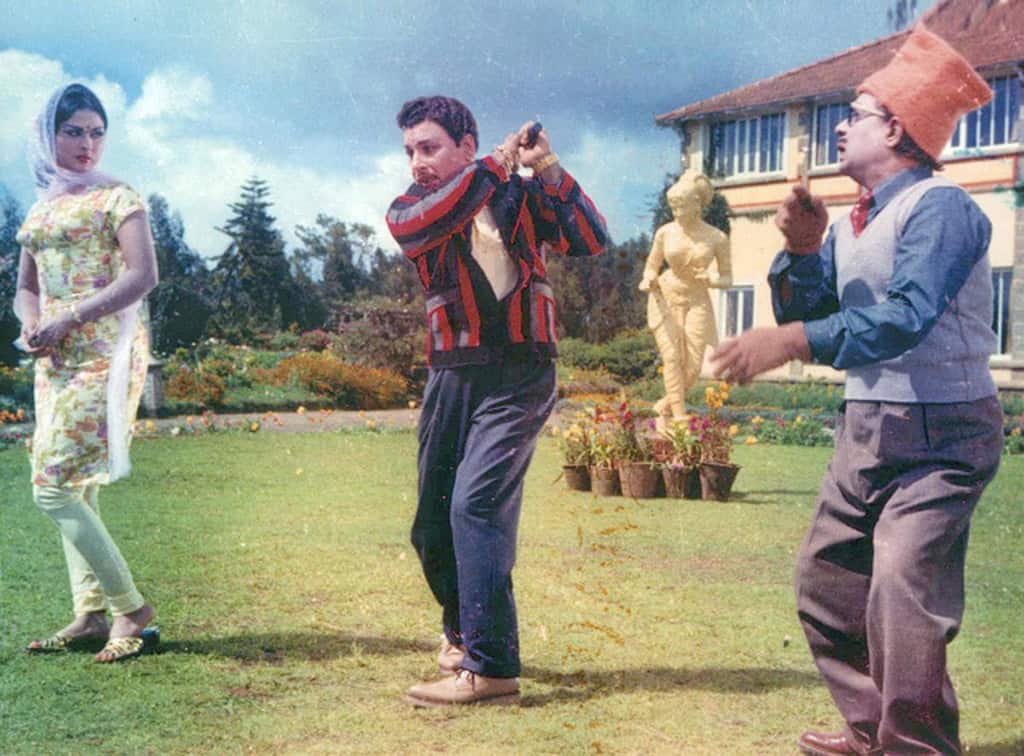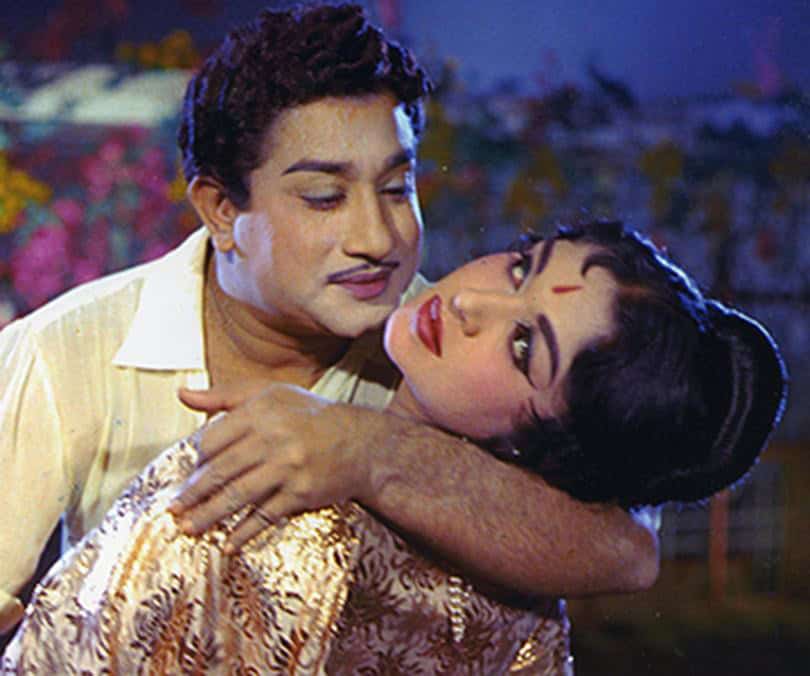Thou wast not born for death, immortal Bird! – John Keats in Ode to a Nightingale.
This is an Ode to a lovely actress who brought the Lovebird to Tamil Cinema with a flutter of her expressive eyes and twinkling hands in her immortal song Lovebirds, Lovebirds from the film Anbe Vaa – an MGR film by A.C. Thirulokachander loosely based on Come September.
B. Saroja Devi was born in Bengaluru on January 7, 1938 to Bhairappa, a Police Officer and Rudramma . She was encouraged by her parents to learn dancing and pursue acting as a career . She made her debut with the Kannada film Mahakavi Kalidasa in 1955 – a great success, winning a National Award for best Kannada film. This was followed by a dance in Panthulu’s Thangamalai Rahasiyam and her Telugu debut film – Panduranga Mahatyam with N.T. Rama Rao. The bird was now flapping its wings and getting ready to fly.
Around this time, 1957, MGR was going through a turbulent period in his film career. He has chronicled this in his autobiography – Naan Yaen Piranden. He was being typecast as a hero fit only for historical and mythological films where he could wield his sword and fight . A few of his “social” films had failed at the box office and he was looking out for a suitable script. Chinna Annamalai, a Congress man and film writer had seen the Hindi film Pocket Maar and suggested the same to MGR and he watched the film and felt it suitable. A.L. Srinivasan came in as the Producer and his brother, the poet Kannadasan wrote the dialogues, for what would become Thirudadey. MGR felt that he needed a relatively new face, who would adjust to his call sheets rather than he having to adjust to the dates and timings of his heroines many of whom were senior and successful like P. Bhanumathi and Anjali Devi. In his book MGR referred to this as Yosanai (suggestion), Nibandhanai (condition) and Kattalai (command) and how one became the next and then the last till it all reversed to teach him a lesson in humility. The producer and director Pa Nilakantan agreed to this and suggested a young girl from Bangalore called Saroja who had done a role in Panthulu’s film. MGR too recalled having been introduced to her by K. Subrahmanyam on the sets of his Kannada film Kachcha Devayani. As ALS was not very sure of her dialogue delivery and accent he was prevaricating till MGR announced that he was casting her in his own production – Nadodi Mannan. Shooting for the film titled Thirudadey ( do not steal) commenced and after a while MGR broke his leg while doing a stage play and everything came to a halt. On recovering several months later, he had to complete his own film Nadodi Mannan.

M.G. Ramachandran and Saroja Devi in Anbe Vaa. Picture courtesy: The Hindu.
In the meanwhile, Saroja Devi had started to fly – acting in Sabash Meena and Bhaaga Pirivinai with Sivaji, Sridhar’s Kalyaana Parisu with Gemini Ganesh, Bhookailasa, Anna Thangi in Kannada opposite Rajkumar and in the title role of Kittur Rani Chinnamma. In Telugu she starred opposite A. Nageswara Rao in Pelli Sandadi, Pelli Kanuka and with NTR in Seetha Rama Kalyanam and Jagadekaveerunni Katha. In Hindi. she acted in Gemini’s Paigham with Dilip Kumar and Sasural opposite Rajendra Kumar. She was soaring high across Tamil, Telugu, Kannada and the Hindi screens. Let us not forget that she also acted with MGR in Nadodi Mannan which too catapulted her to fame. By the time Thirudadey recommenced shooting Saroja Devi had become fully busy. MGR had to adjust to her dates and timings. As he mentions in his book, he would don the make-up and wait for Saroja to come to the sets and shoot from 6 p.m. to 10 p.m. all their combination shots and do his solo portions after that. Thirudadey became a hit and MGR regained his place as a star. MGR and Saroja Devi acted in 26 films including several block busters like Anbe Vaa, Enga Veettu Pillai and Padagotti to name just a few.
She acted in 22 films with Sivaji Ganesan. These include Alayamani, Paalum Pazhamum, Pudhiya Paravai and Iruvar Ullam. Sivaji in a conversation with me remarked how he learnt the importance of “Not acting” from L.V. Prasad the director of Iruvar Ullam. In one scene, Saroja was to perform an emotional piece with Sivaji. The director called Sivaji aside and said this was Saroja’s scene so he should not “act”. He explained, “As the director, I have placed her right in front and focused on her. Her dialogue is emotionally powerful, and it is better if you do not act but just observe.” The film truly brought out her histrionic ability and cemented her place not just as a glamorous heroine but as a competent actor. Saroja did 17 films with Gemini Ganesh including Kalyana Parisu, Parthiban Kanavu and Panama Paasama.

Sivaji Ganesan and Saroja Devi in Pudiya Paravai. Picture courtesy: The Hindu.
She was known for her unique dialogue delivery – likened to the cooing of a bird. In fact, Kannadasan mentions it tongue in cheek in his song – Pesuvadu Kiliya (is it a parrot speaking?). Some people who wanted to drive a wedge between MGR and the poet said that MGR was called a Malayali in the same song – the line being Cheranukku Urava? (Related to the Cheras)– but MGR said, “See the first line where he says Pari Vallal Magana – Son of the great charitable Chola King Pari.” Kannadasan also subtly referred to MGR’s name in the line – Senthamizhar Nilava – Nilavu being the Moon or also Chandran. Saroja Devi had many other hit songs with “Birds” – Chittu Kuruvi muththam kuduthu (Puthiya Paravai – incidentally, the title refers to her as the new bird), Vanna Kili Sonna Mozhi (Deiva Thaai). The greatest achievement of hers was the ability to act simultaneously with so many stars and not get into the bad books of any of them, and she stayed away from controversy or any kind of gossip.
Having chirped and flown across many lands and seas she finally came home to Bangalore after her marriage to Sri Harsha in 1967. She did continue to act in films but knew that a younger set of actors had moved in. She was awarded the Padma Sri and Padma Bhushan and also several State awards. As a young boy I had met her in the early 1960s when she and her mother used to visit my father’s office for legal assistance . She was always smiling and polite, very elegantly dressed and carried herself with the greatest dignity and charm. It is my regret that although I was in the film – Once More, we never had a scene together. The Indian Film Industry truly lost an iconic star when she breathed her last on 14th July 2025.
Remembering Saroja Devi
Saroja Devi was a formidable presence in the South Indian film industry till the 70’s. I recall her from my college days or may be a little later from all those famous M.G. Ramachandran films. She did almost equal number of films with Sivaji Ganesan as well. Kalyana Parisu with Gemini Ganesh, one of her earliest Tamil films is still talked about.
She managed to make a great pair with MGR. Her presence was felt in all the 26 films she did with him. If I remember right, they all did well and many were super hits.
My memory however starts with Anbe Vaa, their super hit film with super hit songs. Who can forget Naan parthathile aval oruthiyaithan. MGR with his keen musical sense made sure they had lovely songs together. Thanks to MGR, she became the reigning queen of Tamil films. Saroja Devi remained the chosen one till she got married and retired. That’s when Jayalalithaa entered the scene.
Saroja Devi not a stunner, but she had tremendous screen presence. In those days heroines did not wear western clothes. She was however considered sexy in her chiffon saris which is laughable today, as she was always well-covered. But unlike many of the heroines who were her contemporaries, she was quite slender. K. Balachander made her the solo heroine in the film, Tamarai Nenjam, which proved what a talented actor she was. Sadly she did not get many opportunities like that.
She holds the unique record of acting as heroine in 161 consecutive films from 1955 to 1984, without playing any supporting roles.
Till today Unnai ondru ketpen from Pudiya Paravai and Love Birds from Anbe Vaa, are remembered even by the younger generation. She spoke Tamil very well with a very slight lilt. Her calling Sivaji, ‘Gopal’ in the last scene in Pudiya Paravai is still admired and imitated.
This original dream girl, Kanavukkanni of our Tamil films will remain in our hearts for ever.
– Sushila Ravindranath